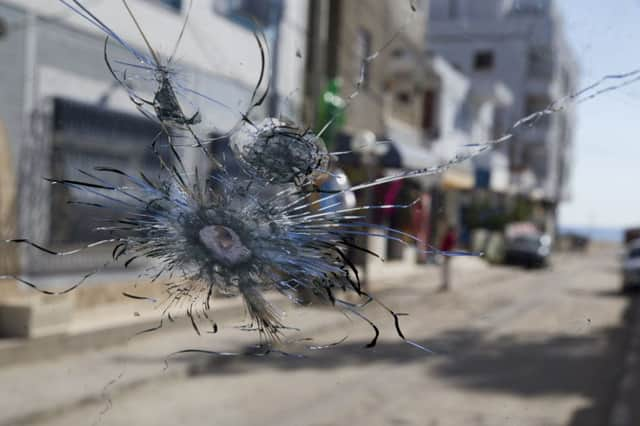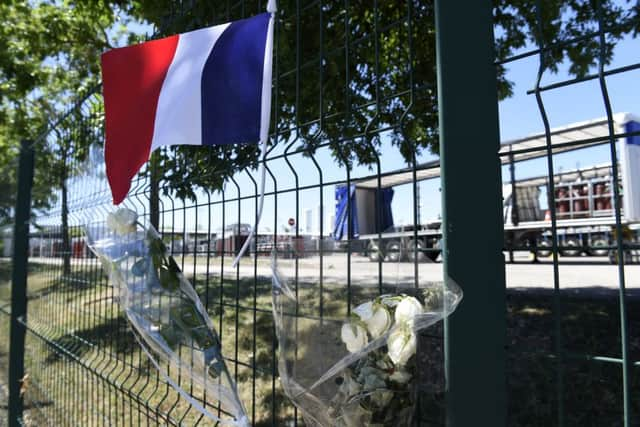Allan Massie: State of mind behind terror threat


The Prime Minister says we shouldn’t speak of “Islamic State” because “it is not a state but a barbaric regime of terrorism and oppression”; it would be better to use the terms Isil or Isis. Alex Salmond agrees with him: “Any description of terrorists which confers on them the image that they are representing either a religion or a state must surely be wrong and an own-goal of massive proportions.” Meanwhile the SNP’s Westminster leader Angus Robertson would have us speak of them as “Daesh – the commonly used phrase across the Middle East”. Names are of course important, and how you speak of these terrorists does matter. Nevertheless, in the wake of last weekend’s triple atrocity, arguing about what we should call the responsible organisation may seem to many about as important as the medieval scholastic debate about the number of angels who could dance on the head of a pin.
Isil, Daesh or whatever calls itself a State. It claims to have revived or restored the caliphate. It holds territory in Syria and Iraq. It has an army which fights battles. In the territory it controls it reportedly carries out the normal tasks of an administration. It finds a way of selling oil. It executes its own horrible version of justice. So it behaves like a state, and no matter how vile and repulsive its activities are, there is no reason to believe that it doesn’t have the support of at least some of the Sunni Muslim population in the territories it controls. We may not recognise it as a state and have good reasons for not doing so. Nevertheless, in reality, it is at least a state in the making, and a state will be made unless it is destroyed.
Advertisement
Hide AdAdvertisement
Hide AdThis is the first problem Isil or Daesh or whatever poses. Now there are two ways in which you can respond to an enemy. You can fight them or you can talk with them. Fighting can itself take two forms: military and economic. If we can prevent this enemy from selling the oil from the fields it controls, this might put some pressure on them. So far it seems we haven’t managed to do this. As for military action, we – the United States, West, Nato – have restricted our intervention to air strikes and the provision of assistance to the Kurds and the Iraqi army, from our special forces and by supplying training. The Kurds have had some success in stemming the enemy’s advance. Much of Iraq is still occupied by Isil (Daesh). Effective military intervention would surely require the use of western ground forces, and for several reasons, some of them good, we are not willing to offer this. So, even if Isil (Daesh) finds its advance checked, as seems for the moment to be the case, there is little reason to hope that it will be dislodged from the territory it now holds; and the longer it holds that territory the more it will seem like a state.


So, for the time being anyway, we have rejected the military option, or at least rejected intervention on a scale sufficient to destroy the enemy. The other option – talks, negotiations – is scarcely on the table. Isil (Daesh) has no interest in talking; in its view there is nothing to talk about. Jaw-jaw may, as Churchill said, be preferable to war-war, but it takes two to talk and any negotiation requires some common ground to have any chance of success. Since there is no common ground between us and this “barbaric regime of terrorism and oppression”, talking would be futile – as well as repulsive. So in the House of Commons politicians are reduced to arguing about the best word to use to describe the enemy.
Oliver Wendell Holmes, a tough-minded American who fought in the Union army in the Civil War and later became a justice of the Supreme Court, declared that he loathed war, but nevertheless wrote that “between two groups that want to make inconsistent kinds of world, I see no remedy except force… Every society rests on the death of men.” This is a grim sentiment which makes most of us, I would guess, uncomfortable today. Yet it is one supported by the evidence of history.
It is hard to conceive of two groups of people with views of a desirable world which are more inconsistent with each other than ourselves and the Islamists, a realisation which logically leads one to making the case for military intervention – that is to say, war, even with all its terrible risks and our knowledge that even a successful war may have deplorable and unwelcome consequences, as we have been reminded by what followed the overthrow of Saddam Hussein and the Baath regime in Iraq. No wonder our politicians hesitate and spout pious banalities.
For there is another thought which must give them pause. It is the knowledge that even the destruction of Isil-Daesh’s pretensions to be a state would not end Islamist terrorism, might even recruit more terrorists, provoke more acts of terrorism. For, if we are honest, we must admit that it is terrorism in the UK, in Europe and the US, acts of terror directed against Europeans or Americans that most concern us, and that we fear most. Moreover we also know that committing acts of terror is not very difficult, is indeed easy, especially if the terrorist is prepared, even willing, to die. You walk up a beach or into a newspaper office or a supermarket with a Kalashnikov, or leave a bomb on a bus or train. The physical act is easy; it’s the moral one that may deter, but does not do so if you are inspired with a zealot’s faith.
No wonder our politicians are at a loss, reduced to declaring that the terrorist will not be allowed to win and that our values – our liberal and democratic values – must prevail. We may all agree about that. But how? The politicians have no answer, and, for once, only a fool would blame them. Reason is asleep in much of the world, and the sleep of reason brings forth Islamist monsters. Our only defence is prevention, which requires measures and acts which risk corrupting our own liberal and humane values.
We live in dark days and there is no sign of light returning.